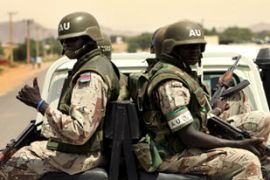Oxfam leaves Darfur refugee camp
Aid agency suspends operations as Sudan makes no promises to end staff attacks.

| Your Views |
|
“Genocide is a crime against humanity as a whole, not just against it’s immediate targets. It therefore falls on the world at large to act” Ekaxuf4,Bulawayo, Zimbabwe Send us your views |
Caroline Nursey, Oxfam’s Sudan programme manager, said on Sunday: “Despite our repeated requests, none of the perpetrators have been held to account, none of the assets stolen in the attack have been returned, and we have not received credible assurances that similar attacks would not take place if we did return.”
Oxfam provided water and sanitation, healthcare and livelihood education to 130,000 Darfuris encamped around Gereida town.
The International Committee for the Red Cross will take over the provision of water.
“As usual in Darfur, the people who will suffer most are the civilians who have already been attacked, forced from their homes and had their lives thrown into turmoil. For the last six months they have not had the level of assistance that they need,” Nursey said.
Peacekeeping force
The conflict has driven about 2.5 million people from their homes over four years of conflict.
Sudan last week agreed to allow a joint UN-African Union force of at least 20,000 police and troops, mostly African, to deploy to the region. Questions over who will command and control the mission remain.
Ambassadors to the Security Council will arrive in Khartoum on Sunday and meet Omar al-Bashir, the Sudanese president.
“The UN Security Council’s urgent priority has to be to get all of the different armed groups to stop targeting civilians and aid workers and adhere to a ceasefire with immediate effect,” Oxfam said in a separate statement on Saturday.
Diplomats say the ambassadors are likely to press al- Bashir to accept overall UN command of the force before they pass any resolution to fund the mission.
Security Council members have discussed the imposition of a no-fly zone and sanctions on Sudan.
Aid agencies have expressed concern that a no-fly zone could endanger their staff who fly around Darfur, the size of France, because many roads are too dangerous.
Mostly non-Arabs took up arms in early 2003 accusing the central government of marginalising the remote west.
Khartoum mobilised fighters to quell the revolt. Those militias stand accused of a campaign of rape, killing and looting.